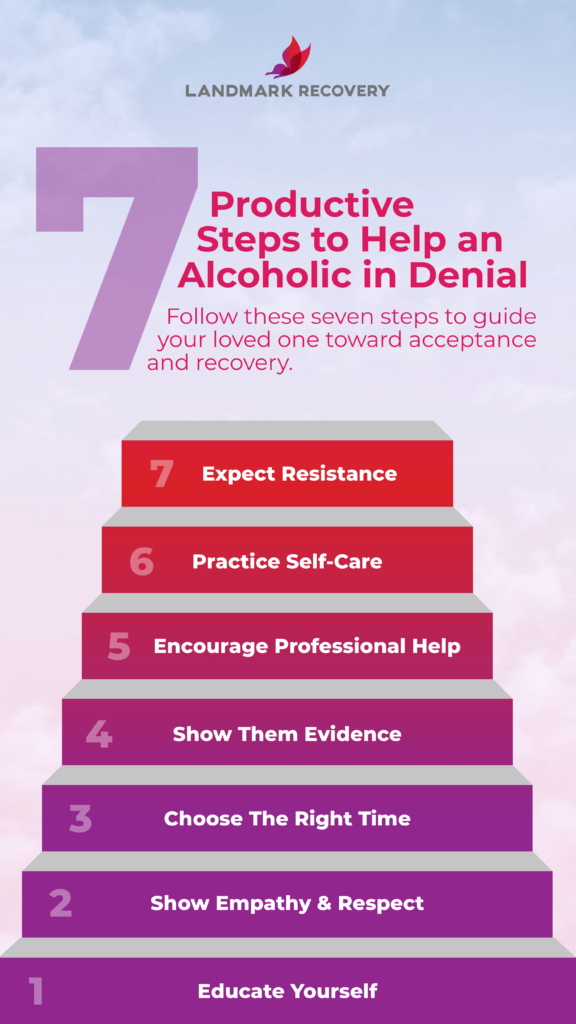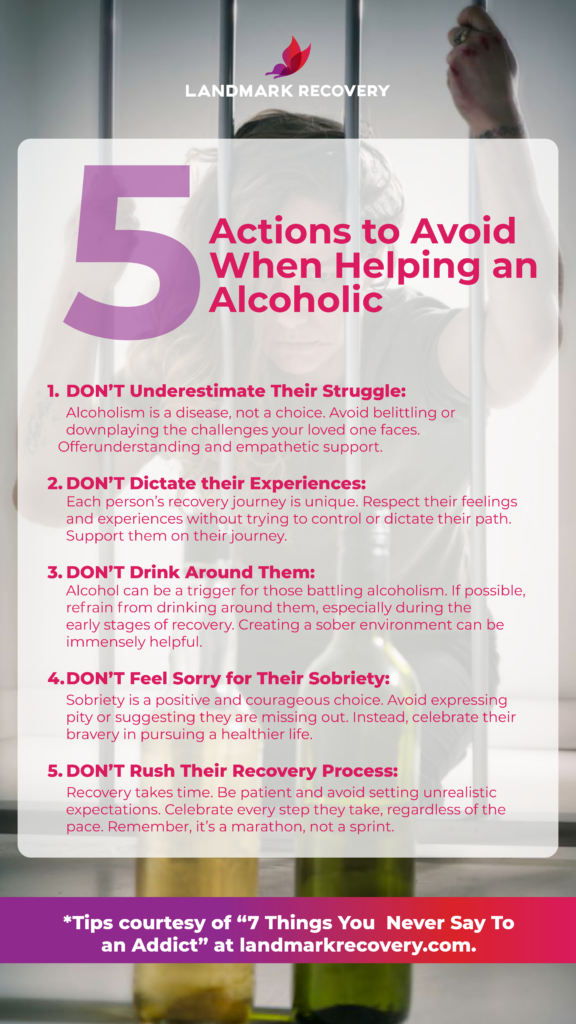A Guide for Families and Loved Ones Supporting an Alcoholic
Updated: July 24, 2023, at 9:41 a.m.
Watching someone you care about struggle with alcohol addiction can be emotionally challenging. It becomes even more difficult when they deny the problem and refuse help. This guide provides invaluable strategies and compassionate advice to support your loved one on their addiction recovery journey.
Key points in this blog:
- Understand alcohol addiction is a disease requiring medical treatment, so empathy and understanding are critical.
- Treatment should be encouraged without force, using professional intervention when necessary.
- Learn about alcohol addiction, symptoms, and treatment to provide practical support.
- Avoid actions that may hinder recovery, like drinking around an alcoholic.
- If an alcoholic refuses treatment, stay patient, offer support, and seek professional help.
Understanding the Struggles of an Alcoholic
Understanding an alcoholic’s struggles is crucial if you truly want to help them break free. Alcoholism is not just a choice or a bad habit—it’s a complex disease that affects the brain, mental health, and emotions. It often fuels issues like trauma, stress, anxiety, and depression.
Why Acceptance is Powerful….but Difficult
Understand accepting alcoholism might intimidate your loved one. It often requires them to face their vulnerabilities, societal stigma, and the fear of life without alcohol. That’s why denial is a common coping mechanism for those with alcohol addiction. By understanding these struggles, you can offer empathy and patience, key elements in providing meaningful support.
7 Productive Steps to Help an Alcoholic in Denial
Follow these seven steps to guide your loved one toward acceptance and recovery.
- Educate Yourself
- Show Empathy and Respect
- Choose the Right Time
- Show Them Evidence
- Encourage Professional Help
- Practice Self-Care
- Expect Resistance
Educate Yourself About Alcoholism
Knowledge is power. Before attempting to help someone else, educate yourself about alcoholism. Understand its symptoms, side effects, and potential treatment options. Recognize that it’s a chronic disease and not a matter of willpower.
Several reputable sources, like the National Institute on Alcohol Abuse and Alcoholism (NIAAA), offer valuable information. For example, it’s estimated that nearly 30 million American aged 12 and older experienced alcohol use disorder (AUD) in the past year. This statistic can help you understand that your loved one isn’t alone in their struggle. Furthermore, joining support groups like Al-Anon can help you understand others’ experiences and strategies that have worked for them.
Show Empathy and Respect
Words matter, so approach your loved one with compassion, respect, and understanding. Avoid confrontational or judgmental attitudes that may push them further into denial. Use ‘I’ statements to express your concern without sounding accusatory. For example, say, “I’m worried about your health,” instead of “You drink too much!“
Choose the Right Time
Choose a time to talk when your loved one is sober and calm, and you’re unlikely to be interrupted. Find a quiet, neutral location that feels safe and might make the conversation less threatening. Also, be patient. It might take multiple discussions before your loved one becomes open to seeking help.
Provide Evidence of Harmful Actions
Sometimes, people struggling with alcoholism aren’t aware of how their behavior affects others. Share specific times when your loved one’s drinking has caused harm to themselves or others. For example, you might mention situations where their drinking led to accidents, strained relationships, or missed opportunities. But remember, the goal is to enlighten, not to blame or shame.
Encourage Them to get Professional Help
Emphasize that it’s okay to ask for help and that professional support is courageous and can be beneficial. Talk about various treatment options like therapy, medication, or alcohol rehab centers like Landmark Recovery, assuring them that recovery is possible with the right help and resources.
Practice Self-Care
Helping someone with alcoholism can be emotionally draining. Therefore, prioritize your well-being while supporting your loved one. Engage in stress-relieving activities, maintain healthy boundaries, and seek support from support groups or professionals. Remember, you can’t pour from an empty cup.
Expect Resistance, but Stay Persistent
Even with your best efforts, your loved one might continue to deny their problem. Be prepared for resistance, and try not to get discouraged. Change takes time, and your patience can make a significant difference.
Ready for a change? Download our “7 Steps infographic” today, share it with someone you care about, or keep it handy for those challenging moments. It’s not just a tool—it’s a visual companion on your recovery journey.
5 Actions to Avoid When Helping an Alcoholic
- DON’T Underestimate Their Struggle: Alcoholism is a disease, not a choice. Avoid belittling or downplaying the challenges your loved one faces. Offer understanding and empathetic support.
- DON’T Dictate their Experiences: Each person’s recovery journey is unique. Respect their feelings and experiences without trying to control or dictate their path. Support them on their journey.
- DON’T Drink Around Them: Alcohol can be a trigger for those battling alcoholism. If possible, refrain from drinking around them, especially during the early stages of recovery. Creating a sober environment can be immensely helpful.
- DON’T Feel Sorry for Their Sobriety: Sobriety is a positive and courageous choice. Avoid expressing pity or suggesting they are missing out. Instead, celebrate their bravery in pursuing a healthier life.
- DON’T Rush Their Recovery Process: Recovery takes time. Be patient and avoid setting unrealistic expectations. Celebrate every step they take, regardless of the pace. Remember, it’s a marathon, not a sprint.
For more tips on supporting a loved one through their alcohol recovery journey, read our blog post, “7 Things You Should Never Say to an Alcoholic.”
What to Do When an Alcoholic Refuses Treatment
Dealing with a loved one who refuses treatment can be disheartening. Remember, recovery must come from within–it can’t be forced. However, you can provide unwavering support and express your concerns honestly. Reassure them of your love and encourage them to seek professional help when ready.
Taking the Next Step
Helping an alcoholic who refuses help is challenging, but you’re not alone. These challenges can become opportunities for growth, healing, and connection.
Get Professional Alcohol Treatment at Landmark Recovery
If you need guidance or assistance, reach out to Landmark Recovery today. Our compassionate team, including our Patient Navigators, will support you and your loved one. Call us at 888-448-0302 to get the help you both deserve.
Related Articles
Check out these articles for more insights and advice:
- Helping A Loved One With A Drinking Problem
- Helping An Alcoholic Parent
- 7 Things You Should Never Say To An Alcoholic
- How To Help An Alcoholic
- High-Functioning Alcoholics And Relationships
- Why Alcoholics Can’t Stop Drinking
- Signs Of A High Functioning Alcoholic
- Am I An Alcoholic?
- How Long Does It Take to Detox from Alcohol?
- 7 Best Foods for Alcohol Detox
- How to Wean Off Alcohol
- How Long Is Alcohol Rehab?
- Can An Alcoholic Quit Cold Turkey?
- Does Alcohol Withdrawal Cause Diarrhea?

Choose Recovery Over Addiction
We're here 24/7 to help you get the care you need to live life on your terms, without drugs or alcohol. Talk to our recovery specialists today and learn about our integrated treatment programs.






